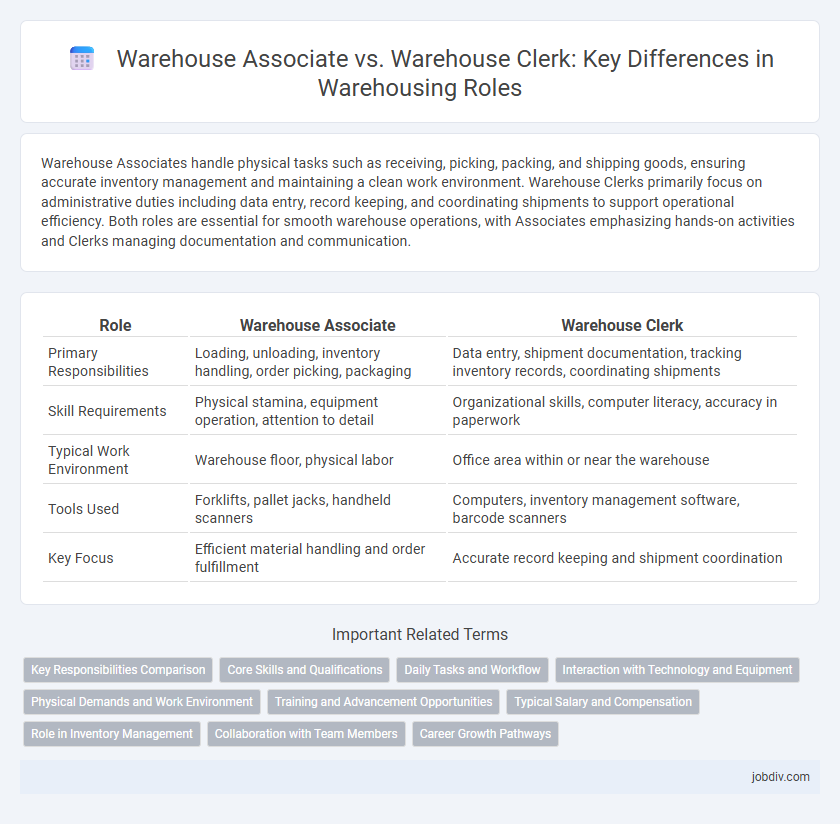Warehouse Associates handle physical tasks such as receiving, picking, packing, and shipping goods, ensuring accurate inventory management and maintaining a clean work environment. Warehouse Clerks primarily focus on administrative duties including data entry, record keeping, and coordinating shipments to support operational efficiency. Both roles are essential for smooth warehouse operations, with Associates emphasizing hands-on activities and Clerks managing documentation and communication.
Table of Comparison
| Role | Warehouse Associate | Warehouse Clerk |
|---|---|---|
| Primary Responsibilities | Loading, unloading, inventory handling, order picking, packaging | Data entry, shipment documentation, tracking inventory records, coordinating shipments |
| Skill Requirements | Physical stamina, equipment operation, attention to detail | Organizational skills, computer literacy, accuracy in paperwork |
| Typical Work Environment | Warehouse floor, physical labor | Office area within or near the warehouse |
| Tools Used | Forklifts, pallet jacks, handheld scanners | Computers, inventory management software, barcode scanners |
| Key Focus | Efficient material handling and order fulfillment | Accurate record keeping and shipment coordination |
Key Responsibilities Comparison
Warehouse Associates primarily handle physical inventory tasks such as receiving, picking, packing, and shipping goods, ensuring accurate and efficient movement of products within the warehouse. Warehouse Clerks focus on administrative duties including inventory record-keeping, data entry, and coordinating shipping schedules to maintain organized and up-to-date warehouse documentation. Both roles are crucial for seamless warehouse operations, with Associates emphasizing hands-on logistics and Clerks managing operational data and communication.
Core Skills and Qualifications
Warehouse Associates excel in physical tasks such as inventory handling, equipment operation, and order picking, requiring strength, stamina, and attention to detail. Warehouse Clerks specialize in administrative duties including inventory tracking, data entry, and shipping documentation, necessitating strong organizational skills, computer proficiency, and accuracy. Both roles demand knowledge of warehouse management systems (WMS), adherence to safety protocols, and effective communication skills.
Daily Tasks and Workflow
Warehouse Associates handle physical inventory tasks such as receiving, sorting, and packing goods, as well as operating forklifts and managing stock placement. Warehouse Clerks focus on administrative duties including maintaining inventory records, processing shipment documentation, and coordinating order fulfillment through software systems. Both roles collaborate to ensure efficient warehouse operations by balancing hands-on inventory management with accurate data tracking and workflow organization.
Interaction with Technology and Equipment
Warehouse Associates typically operate forklifts, pallet jacks, and handheld barcode scanners for inventory management, emphasizing physical handling and real-time data entry. Warehouse Clerks primarily use computer systems, inventory software, and shipping documentation tools to process orders, track shipments, and maintain warehouse records. Both roles require proficiency with warehouse management systems (WMS), but Associates prioritize equipment handling while Clerks focus on data accuracy and communication through technology.
Physical Demands and Work Environment
Warehouse Associates often perform physically demanding tasks such as lifting heavy items, operating forklifts, and moving pallets, requiring strength and endurance in a fast-paced environment. Warehouse Clerks typically work in less physically intensive roles, focusing on inventory management, record-keeping, and data entry, usually in an office or warehouse setting with minimal heavy lifting. Both roles require standing for extended periods, but Associates face more strenuous physical activity due to manual labor and equipment operation.
Training and Advancement Opportunities
Warehouse Associates receive hands-on training in inventory management, order fulfillment, and equipment operation, positioning them for rapid skill development and promotion to supervisory roles. Warehouse Clerks focus on administrative tasks such as data entry and shipment documentation, gaining expertise that can lead to advancement in logistics coordination or inventory control positions. Both roles offer distinct training pathways, with Associates gaining practical operational skills and Clerks developing administrative proficiency critical for career growth in warehousing management.
Typical Salary and Compensation
Warehouse Associates typically earn an average salary ranging from $30,000 to $40,000 annually, with compensation often including overtime pay and performance bonuses. Warehouse Clerks usually receive a slightly higher average salary between $33,000 and $45,000 per year, reflecting their additional administrative duties and inventory management responsibilities. Both roles may offer benefits such as health insurance, retirement plans, and shift differentials, depending on the employer and location.
Role in Inventory Management
Warehouse Associates handle physical tasks such as receiving, storing, and distributing inventory, ensuring accurate stock levels through regular cycle counts and proper organization. Warehouse Clerks primarily focus on administrative duties, including maintaining inventory records, updating databases, and coordinating communication between warehouse operations and management. Both roles are essential for efficient inventory management, with Associates managing hands-on stock control and Clerks ensuring data accuracy and process tracking.
Collaboration with Team Members
Warehouse Associates and Warehouse Clerks both play essential roles in maintaining operational efficiency, with Associates primarily handling physical inventory tasks and Clerks focusing on documentation and data management. Collaboration between these roles ensures accurate inventory tracking and smooth workflow, as Associates rely on Clerks for proper record-keeping while Clerks depend on Associates for timely updates from the warehouse floor. Effective communication and teamwork enhance order accuracy, reduce errors, and streamline overall warehouse operations.
Career Growth Pathways
Warehouse Associates primarily handle physical tasks such as picking, packing, and inventory management, serving as an entry point into warehousing operations. Warehouse Clerks focus on administrative duties like data entry, shipment documentation, and inventory tracking, opening pathways toward logistics coordination and supply chain management roles. Career growth for Warehouse Associates often leads to supervisory or forklift operator positions, while Warehouse Clerks can advance into inventory control specialists or warehouse management careers.
Warehouse Associate vs Warehouse Clerk Infographic

 jobdiv.com
jobdiv.com